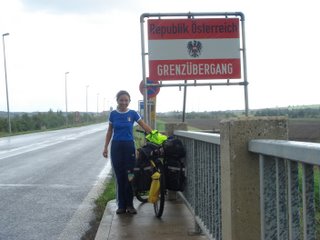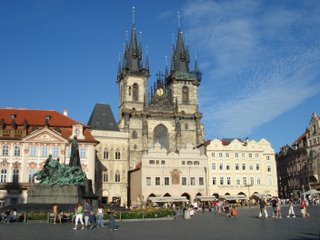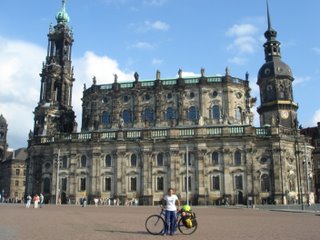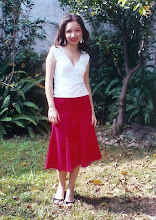Berlin, Day 4.
Godwin's Law.
Holy smokes, Batman! Will this nightmare never end?
Today I had to change rooms at the hostel. These guys have never heard of good computer algorithms because they have the registry of guests all written out by hand, and if you ever want to extend your stay and someone else had a reservation for your room it is apparently impossible to send them to a different room so that you can stay in yours, but you have to move instead so that the person with the reservation gets the room they originally placed them in.
Silly, I know, but this is not such a big problem, except that when I came downstairs in the about half an hour before checkout time to ask for my new room key they said they could not give it to me until 2 p.m.
O.K., could they at least tell me what room it is?
They thought this strange, asked me why I wanted to know that.
"Because," said I a bit exasperated at having to explain the obvious, "that way I can move my luggage into the new room."
"Ah, no problem," they said, "just bring down your luggage and we will keep it in the luggage room. After 2 p.m. you can come pick it up and move it to the new room."
When you have to carry 2 panniers and a backpack that weigh, combined, about 30 kilograms up and down 5 flights of stairs, you can see why this was a very unappealing prospect. I would 10 times rather carry it up one or two flights or maybe even none if the new room is on the same floor. Additionally, consider, that I had already stayed in the room in question for 4 nights, and after such a long stay, one tends to "settle in" a bit: things are unpacked and strewn around the room, towel left to dry by the windows, books on the table, toothbrush in the bathroom, etc. Re-packing would require a half an hour at least. Not the kind of thing I like to waste my time doing.
So I tried to explain: "My luggage is very heavy, I would rather not have to carry it up and down if possible."
The receptionist gentleman: "Sorry, that's the way it is."
Me: "Why?"
(Always ask these rule-obsessed people "why". It is interesting, how it invariably throws them for a loop.)
He hesistated. I could tell he was trying to do some really fast thinking, from the frown that followed. Finally, he brightened up and said: "We need to keep the rooms clear for the cleaning staff."
"I see," said I. "Moving my luggage to the next room will not disturb the cleaning, as I will leave it in the lockers provided. May I have the key now, please?"
He did not expect this. He was at loss for words, for a minute. Another receptionist approached (British woman, but clearly having lived in Berlin for a while), asked what the problem was. He explained. She said: "Yeah, sorry, not allowed."
Me: "I understand what you are saying. However, my luggage is very heavy, and it would be of a tremendous help if I could just move it to the new room now. If you will not give me the key, could you at least please tell me what room it is?"
Him: "But how is that going to help, if I tell you what room it is now or at 2 p.m.? I will not be able to give you the key until 2 p.m. anyway."
Me (again, I hate having to explain the obvious): "If you tell me what room it is, I will go ask the people in the room if it is o.k. with them for me to move my luggage in right now."
Her: "What, and wake them up this early?"
Me: "It is 9:30 a.m. It is half an hour before checkout time. Someone in the room should be awake already."
[In case I didn't mention it before, in Youth Hostels the rooms tend to house between 4-8 people in dorm-style bunks]
Her:"But you cannot just go into a room and disturb the people there. How would you like it if someone did that to you?"
Holy scripes! Some people really are obtuse, I thought. "I will not disturb them. I will ask politely if they mind if I leave my things there. I will not wake any still-sleeping people. Naturally, if I had the key, it wouldn't even be necessary for me to make any noise at all, but you will not give it to me. I will therefore simply knock on the door. So, will you tell me the room number, please?"
Him: looks at her. She stares at him. "No" she finally says.
Intransigent, eh? I tried to the old trick of getting them to care: "Please, my luggage is very heavy, and I cannot come back here at 2 p.m. today..."
Him: "But it is the rule...."
Ha ha ha ha!! Here we go. I have a lot of patience, but this just riled me up, and besides it had been clear from the past 5 minutes that the conversation was going nowhere. I couldn't resist, at this one....
Godwin's Law is a little "meme" from the old days of the usenet discussion groups. It basically states that the longer a usenet discussion lasts, the probability of one of the parties being called a Nazi or compared to Hitler approaches one. Usenet lore has it, that at this point, a thread can therefore be declared as "has been going on for too long", that the discussion has degenerated into a flame war, and there is no more point for discussing any longer. Invoking Godwin's Law is the automatic thread ender, by convention.
So, why shouldn't the automatic usenet thread ender be used in this particular conversation, that as I said was going nowhere, and particularly, because the trigger words that very nicely summed up my German experience in my brief sojourn in this fascinating country: "But this is the rule!", are words that I cannot, as someone who thinks with her very own two brain cells, suffer as the justification for
anything?
Me (smiling sweetly and shrugging): "It is just a stupid rule. What, if the rule says 'Kill the Jews', will you follow that one also?" [and here I braced myself for the new level of conversation I had just so rashly and mischievously propelled the three of us to by gripping the counter of the reception I was leaning on a little tighter, because, you see, calling an American, or a Mexican, or anyone else a "Nazi" will probably produce some incredulous laughter, but, doing this to a German would most surely touch an exposed nerve, for obvious historical reasons...]
I needn't have worried. At my "It is just a stupid rule...", before I had had a chance to even finish with the second part (the fun part!) of my phrase they had already started talking above me at the same time each of them saying fragments along the lines of: "...cleaning staff...", "the rules are there for a reason!", or "what if we did this for everyone", and other fragments I couldn't catch as I was busy preparing myself for the explosion of my statement, however, it seemed that due to the disordered interruption at my remonstrations, the second part, the explosive part of my comment....had gone unheard.
Or ignored, which was just as likely. I did say it loud enough that at least two people nearby could overhear.
Eventually, when the two receptionists finally stopped talking at the same time, the woman sighed and left (went to the hostel bar to attend to something or at any rate returned to where she was before she "joined" this conversation), leaving the gentleman with an, admittedly, rather helpless look on his face.
At about that time two fellows approached the reception desk, checking out or some other rutinary hostel request. The remaining receptionist started attending to them, and stopped looking at me.
I waited with a pleasant smile on my face, because it made me chuckle (a chuckle I supressed, of course), the idea that by simply pretending I wasn't there would make the issue go away.
After 10 minutes, the fellows left. I smiled at the receptionist, who returned my gaze with a cold, very angry stare.
I smiled even more.
He kept staring.
And then I decided to try a different approach (thanks to A.C.T. in San Francisco Acting I teacher Jeffrey, for this very wise piece of advice: "When you are trying [i.e. in Theater or acting, etc] to get someone else to do something, and this something is important enough, it is intrinsic in human nature, to try different things. If yelling doesn't help, try being quiet. If pleading doesn't help, try commanding."). And, remembering another acting teacher's advice: (Marvin, Acting II teacher: "In dialogues where you're fighting, it is very boring, very uninteresting, just to yell, and it accomplishes nothing. Even when you're fighting...find the love in things."), I then softened all my features, relaxed my stance into a welcoming position, as if about to receive an embrace, and in the sweetest, most affectionate voice I could find, as if cuddling a lover, I said:
"Come on." [tenderest smile] "It is not a big deal...."
A long exhaling sound followed as he placed the key to the new room on the counter and said: "Oh, alright then, fine.".
:o
Honestly! The kinds of things one must stoop to to get what one wants! Amazing....
(Still, it was a good trick to stumble on, must keep for future reference)
Anyway, after dealing with the Hostel people I headed over to the Bundestag again to try to finally catch the insides of it (including, possibly, seeing the promised "democracy in action" much promoted in the brochures for tourists that
I told you about before). Not surprisingly due to the morning events, I arrived there not as early as I had hoped (only half an hour earlier than three days ago), but luckily today there were no lines outside the building at all, so I was able to get in fairly quickly no problem. After heading up to the top floor to see the beautiful and modern
Glass Cupola I asked at the information desk (in German, of course. I only adress people in German here, except at the Youth Hostel, where the staff, except for the gentleman this morning, is British) if I could join a guided visit to the plenary session hall. The information desk gentleman (he was in his late 40's or 50's) replied to me with a complicated schedule and times for guided visits that went from half an hour past the current time (it was 10 a.m. at the moment) all the way to 5 p.m. I asked politely if he could repeat slower, please (I had just been the victim of a barrage of very fast, supernumerary information, and I only needed to once more catch the first part of what he had said).
Can you believe it? He replied, that the visits were led in German, and that they would speak as fast as he just had (this was, of course, not my question nor incidentally the reason I'd asked for repetition. The list of times had simply been too long for me to remember which one came the closest to 10 a.m., the present time). Honestly! As if it were the tourist's fault, not to know the schedules by memory inside out, somehow.
{sigh}
Nope, it was not over. During the actual Parliament visit (they take you to the upper floors of the building, where you can sit down to a very nice
view of the Plenary Hall), and where they tell you lots of rather uninteresting details about the building of the glass cupola, instead of what I wanted to know, which was more along the lines of German politics (but I recognize that on this one I was probably expecting a bit too much from a simple tourist guided visit). But as if this weren't exasperating enough, when she opened the floor for visitor's questions someone (most of the visitors were German, of course) started asking cum arguing with her about the details of the date of the construction of the cupola. She had said it was 1999 when the cupola was completed, but she had also said something about 1957, which was when reconstruction of the whole Reichstag building had begun, but apparently the tourist had misunderstood, and he was arguing with her that: she had first said that the glass cupola had been completed in 1957, and how could that be right, if Norman Foster (who designed the cupola) only won the design in 1992? So then it couldn't have been 1957, right? No, said the guide, it was 1999, but then, said the tourist, what about the fact that you said in 1957, and so on and so forth, going on in a very polite but very tense (and incredibly boring!) discussion that lasted no less than 20 minutes, until the guide finally said: "Let's give someone else the opportunity to ask questions!". But all in all, very unpleasant. As if these details were so important. So the guide is wrong? Keep quiet then, then look up the facts in the encyclopedia for your own satisfaction, it is not necessary, I think, to both embarass the guide and waste the time of 50 other people who do not care that you are right and she is wrong or vice-versa.
Strange things, that these people find important.
{shrug}
Anyway, after that I headed over to the Philharmonic. I needed some cheering up. Find out if they were playing at all (though I didn't have my hopes up for this one, as it is August, and most orchestras are on vacation during this time, as I've said), or at least how much tickets cost during the season, or how pretty the building is, etc.
So I arrived, and the first thing that struck me was the building of the Philharmonic Hall.
THIS is the Philarmonic??!? This garish, icky yellow, corrugated metal building is the host of the most renowned orchestra on the planet?!??
I hoped it was prettier on the inside.
I couldn't really tell, though, because, as expected, the Philharmonic was not in session in August: I am 11 days too late (the rage, Ian! I should've pedalled faster!).
With nothing left to do now, except slowly circle the neglected, abandoned, lonely dilapidated Philharmonic building, the culmination of my 4 month-long trip, the much awaited high point, geographically and culturally, of my journey, helplessly taking the obligatory pictures of this oh so highly reputed building with its oh so highly reputed music inside that I would not be hearing live, I realized suddenly (or rather, over a period of 4 months converging in this instant) that this much touted Europe, the First World, was not really all that much different from my own country, and what's more, with its own share of absurd problems to solve to boot, and I didn't know whether to laugh or cry at the irony.
And as the tears of frustration, helplessness and anger welled up in my eyes, not at the the clichéd "Wizard of Oz" realization that "there's no place like home", but rather: "Everywhere
is like home," that everywhere is the same thing, with variations, and there is no running away that will make the bad things disappear, because in the end there is nowhere, really, to run to, that there is, in the end, no such thing as "better", I realized that without my consent, my heart had settled for the latter.
One....should not visit Berlin without a friend.







